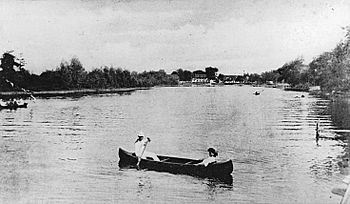Chateauguay River facts for kids
Quick facts for kids Chateauguay River |
|
|---|---|

Canoeing on the river in Châteauguay, Quebec, 1910
|
|
| Other name(s) | Chateaugay River |
| Countries | United States, Canada |
| Locations | New York, Quebec |
| Physical characteristics | |
| River mouth | Saint Lawrence River 22 metres (72 ft) |
| Length | 121 km (75 mi) |
| Basin features | |
| Basin size | 2,543.4 km2 (982.0 sq mi) |
| Tributaries |
|
The Chateauguay River is a cool river that flows through two countries: the United States and Canada. In the U.S., it's sometimes called the Chateaugay River. It starts in New York State and then makes its way into Quebec, Canada.
This river is a tributary, which means it's a smaller river that flows into a bigger one. The Chateauguay River eventually joins the mighty Saint Lawrence River. It passes through different areas, including Clinton and Franklin in New York, and several towns in Quebec like Huntingdon, Ormstown, and Howick.
During winter, the river usually freezes over. From mid-December to late March, you can often find its surface covered in ice. It's generally safe to be on the ice from late December to early March. The amount of water in the river changes with the seasons and how much rain or snow falls.
Contents
Where Does the Chateauguay River Flow?
The Chateauguay River is surrounded by other important waterways. To the north, it's near the Saint Lawrence River and the Saint Lawrence Seaway, which is a big shipping route. To its east are the Noire River and the Lacolle River. On its west side, you'll find the Saint-Louis River.
The river starts in the Adirondack Mountains in New York State. Its journey begins at Upper Chateauguay Lake. From there, it travels about 121 kilometres (75 mi) (or 75 miles) before reaching the Saint Lawrence River near Montreal. Along the way, it flows through many towns and villages in Quebec, including Elgin, Hinchinbrooke, Huntingdon, Dewittville, Ormstown, and Châteauguay.
The River's Journey
The Chateauguay River's path can be divided into three main parts:
In the United States
The river begins its journey in Clinton County, New York. It flows northwest through a small mountain valley. It also passes through Lower Chateauguay Lake. As it continues, it enters Franklin County, New York. The river then flows through a deep valley, picking up water from smaller streams. It passes by the town of Chateaugay before reaching the border with Canada. This part of the river is about 32.9 kilometres (20.4 mi) long.
Crossing into Canada
Once the river crosses the border into Quebec, Canada, it continues its journey for about 53.7 kilometres (33.4 mi). It flows northwest, sometimes forming curves through forests and farmlands. It picks up water from other rivers and streams like the Hinchinbrooke River and the Trout River.
The river then flows through the center of Huntingdon. It collects more streams, like the Cunningham and Cowan creeks. Further along, it passes under Route 138 and through the village of Ormstown. This section of the river also meets the rivière des Anglais.
The Lower Course
The final part of the river's journey is about 20.2 kilometres (12.6 mi) long. After joining the rivière des Anglais, the Chateauguay River flows north. It passes by the village of Sainte-Martine and collects water from the rivière de l'Esturgeon.
As it gets closer to its end, the river flows through agricultural areas and then into urban areas. It passes under Autoroute 30 and other bridges. Finally, the river splits around Saint-Bernard Island before emptying into the Saint Lawrence River.
Wildlife and Nature
The Chateauguay River is a home for many different kinds of animals. You can find lots of birds and fish living here. It's also a very important spot for migrating ducks and Canada geese. These birds stop at the river during their long journeys.
For many years, the river faced pollution problems. But thankfully, people have worked hard to clean it up! Now, the Chateauguay River is becoming a great place for eco-tourism. This means people can visit to enjoy nature, often by canoeing or kayaking, while also helping to protect the environment.
The entire area around the river, including its drainage basin, is known as the Chateauguay Valley.
 | John T. Biggers |
 | Thomas Blackshear |
 | Mark Bradford |
 | Beverly Buchanan |

